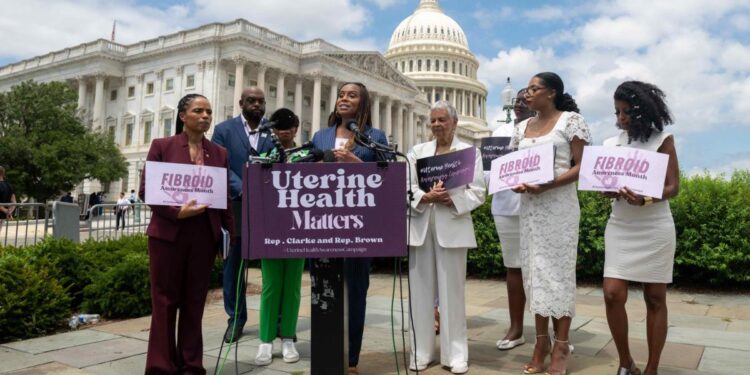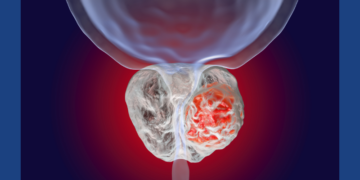July 27, 2025 Story by: Editor
U.S. Congresswoman Shontel M. Brown (OH-11) has reintroduced the Uterine Fibroid Intervention and Gynecological Health and Treatment (U-FIGHT) Act, legislation aimed at expanding federal investment in research, education, and data collection around uterine fibroids.
Announced during Uterine Fibroid Awareness Month, the U-FIGHT Act forms a key pillar of a broader Uterine Health Initiative, which seeks to confront what medical experts have called a “silent epidemic” affecting millions of women—especially women of color. Uterine fibroids are noncancerous tumors that grow in the uterus and can cause debilitating symptoms, including heavy menstrual bleeding, chronic pelvic pain, and infertility.
According to the National Institutes of Health (NIH), up to 80% of Black women and nearly 70% of white women develop fibroids by age 50, yet federal investment in fibroid-specific research remains disproportionately low.
“Far too many women suffer in silence,” Congresswoman Brown said in a statement released by her office. “The U-FIGHT Act is a bold step to ensure uterine health is no longer marginalized in national research and public health strategies.”
The U-FIGHT Act was announced as part of a Uterine Health Legislative Initiative featuring multiple bills introduced by Congresswoman Yvette Clarke (NY-09), Senator Cory Booker (D-NJ) and Congressman David Scott (GA-13), in addition to Brown and Alsobrooks.
What the U-FIGHT Act Would Do
The legislation proposes to:
- Increase federal funding through the National Institutes of Health (NIH) for biomedical and clinical research focused specifically on uterine fibroids, including prevention and treatment.
- Improve data collection and reporting at the Centers for Disease Control and Prevention (CDC) to better track the prevalence, severity, and treatment outcomes for patients with fibroids.
- Authorize the Department of Health and Human Services (HHS) to run public awareness campaigns that inform people about symptoms, risks, and treatment options.
- Promote research equity, particularly as fibroids disproportionately affect Black and Latina women and are often misdiagnosed or underdiagnosed in underserved communities.
Brown’s bill has garnered early support from healthcare professionals and advocacy organizations, including the Fibroid Foundation, which applauded the initiative for “centering patient experience and closing racial health gaps.”
Key Data
- By age 35, 60% of Black women may have fibroids (vs. lower percentages in white women). By age 50, over 80% are affected. The incidence is markedly higher and earlier in life compared to white women.
- Black women have been underrepresented in fibroid studies, with fewer than 25% of published trials reporting racial data.
- Black women are about 2–3 times more likely to receive a hysterectomy compared to white women for fibroids. They also face higher higher hospitalization and surgical intervention rates—approximately 3.5× higher hospitalization, 6.8× more myomectomies, and 2.4× more hysterectomie.
- Black American women report higher rates of heavy bleeding, cramping, abdominal pain, anemia, and missed work than their white counterparts. For instance, they are over twice as likely to report severe menstrual pain (RR = 1.80) and nearly three times as likely to experience anemia (RR = 2.73).
Angela Alsobrooks voices support, highlights regional impact
Joining Brown in sounding the alarm was Angela Alsobrooks, Prince George’s County Executive and current U.S. Senate candidate from Maryland. Alsobrooks, who has shared her own struggles with fibroids, announced complementary state-level legislation and voiced strong support for federal action.
“The pain is real. The suffering is real. The silence has gone on too long,” Alsobrooks told reporters at a July 2024 press conference. “Women are being told that pain is normal, that hemorrhaging is normal — and we’re here to say, ‘No more.’”
Prince George’s County has seen fibroid-related emergency room visits double over the past decade, a stark reminder that fibroid disease is not only a national public health issue but also a local crisis in many communities.
Next Steps in Congress
The U-FIGHT Act now awaits committee referral and review. Advocates hope it will gain bipartisan momentum as awareness around uterine health increases nationally. Brown has vowed to continue building support across the aisle, emphasizing that fibroid disease is not partisan — it’s personal.
“We must break the silence and elevate women’s uterine health as a national priority,” Brown said. “The time to act is now.”
If passed, the U-FIGHT Act could mark a turning point in the fight for reproductive health equity — and for the millions of women who have waited too long to be seen, heard, and healed.
Source: Congresswoman Shontel Brown / WUSA
















